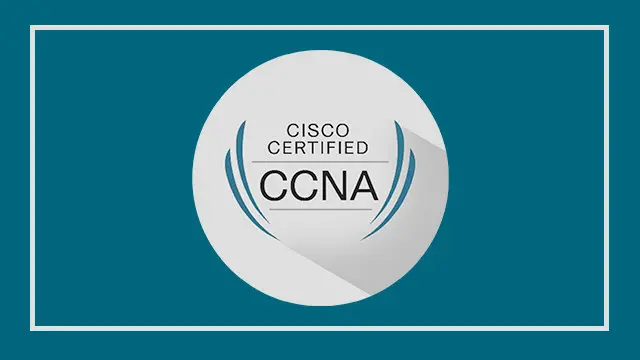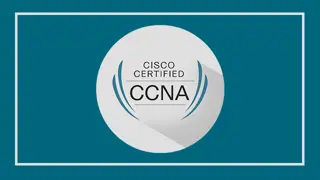
Cisco CCNA 200-301 Implementing and Administering Cisco Solutions
Gain Cisco CCNA Certification | Student discount card eligible | Tutor Support
Open IT
Summary
- Exam(s) / assessment(s) not included in price, and must be purchased separately
- Tutor is available to students
- TOTUM card included in price What's this?
- Job guarantee programme is included in this course
Add to basket or enquire
Overview
**Get a Job role such as Entry-Level Network Engineer / Network Administrators / Network Support Technicians / Help Desk Technicians, and many others by completing the Cisco CCNA training.**
It is the perfect time to upgrade your networking skills and knowledge at an affordable price.
Cisco CCNA 200-301
Validates the ability to install, configure, operate, and troubleshoot medium-size routers and switched networks, including implementation and verification of connections to remote sites in a WAN. CCNA curriculum includes essential mitigation of security threats, VLANs, Ethernet, access control lists (ACLs), wireless networking concepts and terminology, and performance-based skills. Candidates for the CCNA can qualify for the certification by passing an exam at a local exam centre.
With the Cisco CCNA 200-301 course, you can gain valuable skills in computing and earn over £30,000 starting salary. In addition, you will also receive a CCNA certificate to show your accomplishment.
Description
Overview of the course:
The Cisco Certified Network Associate (CCNA 200-301): Implementing and Administering Cisco Solutions, a globally recognized certification, provides networking skills and knowledge that will increase your understanding of routing and switching topics.
Cisco CCNA 200-301 Modules:
1. Networking
The Cisco Certified Network Associate (CCNA 200-301): Implementing and Administering Cisco Solutions, a globally recognized certification, provides networking skills and knowledge that will increase your understanding of routing and switching topics.
- Introduction to TCP/IP Networking
- Fundamentals of Ethernet LANs
- Fundamentals of WANs
- Fundamentals of IPv4 Addressing and Routing
- Fundamentals of TPC/IP Transport and Applications
2. Ethernet LANs
The module focuses on skills like understanding how LANs work, configuring different switch features, verifying that those features work correctly, and finding the root cause of the problem when an element is not working correctly.
- Using the Command-Line Interface
- Analyzing Ethernet LAN Switching
- Configuring Basic Switch
- Configuring and Verifying Switch Interfaces
3. VLANs and STP
Virtual LANs (VLAN) have an impact on many parts of a switch’s logic. Frame forwarding happens per VLAN. MAC learning adds MAC table entries, and those entries include the associated VLAN. Even Spanning Tree Protocol (STP), a big focus in Chapter 1 of this course, often happens per VLAN. This chapter examines how many switch core features work in the context of VLANs.
- Implementing Ethernet Virtual LANs
- Spanning Tree Protocol Concepts
- Spanning Tree Protocol Implementation
- VLANs Configuration, Verification and Troubleshooting
4. IPv4 Addressing
An IP address is a numeric identifier assigned to each machine on an IP network. It designates the specific location of a device on the network. An IP address is a software address, not a hardware address - the latter is hard-coded on a network interface card (NIC) and used for finding hosts on a local network. IP addressing was designed to allow hosts on one network to communicate with a host on a different network regardless of the type of LANs the hosts are participating in.
- Perspectives on IPv4 Subnetting
- Analyzing Classful IPv4
- Analyzing Subnet Masks
- Analyzing Existing Subnets
5. IPv4 Routing
This section first lists the similarities between a switch and router CLI, and then introduces the configuration required to make the router start forwarding IP packets on its interfaces.
- Operating Cisco Routers
- Configuring IPv4 Addresses and Static Routes
- IP Routing in the LAN
- Troubleshooting IPv4 Routing
6. OSPF
Configure, verify and troubleshoot single-area and multiarea OSPFv2 for IPv4 and IPv6(excluding authentication, filtering, manual summarization, redistribution, stub, virtual-link, and LSAs).
- Understanding OSPF Concepts
- Understanding OSPF for IPv4
- Understanding OSPF for IPv6
7. IP Version 6
This chapter looks at the big concepts, while the second section looks at the specifics of how to write and type IPv6 addresses.
- Fundamentals of IP Version 6
- IPv6 Addressing and Subnetting
- Implementing IPv6 Addressing on Routers
- IPv6 Routing Operation and Troubleshooting
8. IP Access Control Lists
This chapter explains the basics of the TCP/IP transport layer and the TCP/IP application layer. The functions of these higher layers play a big role in real TCP/IP networks, so it helps to have some basic understanding before moving into the rest of the book, where you go deeper into LANs and IP routing.
- Introduction to TCP/IP Transport and Applications
- Basic IPv4 Access Control Lists
- Advanced IPv4 Access Control Lists
9. Security Services
In this chapter, you will learn about many aspects of an enterprise network that can be exploited, as well as some ways you can protect them.
- Security Architectures
- Security Network Devices
Who is this course for?
This course is suitable for the following individuals:
- Those pursuing the Cisco CCENT or Cisco CCNA Routing and Switching certification.
- Entry-level Network Engineers
- Network Administrators
- Network Support Technicians
- Help Desk Technicians
Requirements
While this course does not have any specific prerequisites, it is recommended that attendees have a familiarity with network concepts.
Career path
Holding a CCNA certificate can be advantageous when pursuing various networking job roles, including entry-level and higher-level positions such as network engineer, network specialist, or network administrator. It serves as a valuable credential that validates your expertise and can increase your chances of securing employment in the networking field.
Questions and answers
Currently there are no Q&As for this course. Be the first to ask a question.
Reviews
Currently there are no reviews for this course. Be the first to leave a review.
Legal information
This course is advertised on reed.co.uk by the Course Provider, whose terms and conditions apply. Purchases are made directly from the Course Provider, and as such, content and materials are supplied by the Course Provider directly. Reed is acting as agent and not reseller in relation to this course. Reed's only responsibility is to facilitate your payment for the course. It is your responsibility to review and agree to the Course Provider's terms and conditions and satisfy yourself as to the suitability of the course you intend to purchase. Reed will not have any responsibility for the content of the course and/or associated materials.


